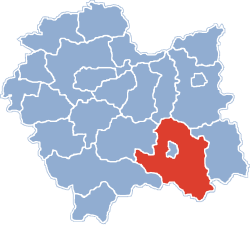Nowy Sącz County
Nowy Sącz County
Powiat nowosądecki | |
|---|---|
 Location within the voivodeship | |
 Division into gminas | |
| Coordinates (Nowy Sącz): 49°37′26″N 20°41′50″E / 49.62389°N 20.69722°E | |
| Country | |
| Voivodeship | Lesser Poland |
| Seat | Nowy Sącz |
| Gminas | |
| Area | |
| • Total | 1,550.24 km2 (598.55 sq mi) |
| Population (2006) | |
| • Total | 197,718 |
| • Density | 130/km2 (330/sq mi) |
| • Urban | 36,952 |
| • Rural | 160,766 |
| Car plates | KNS |
| Website | http://www.sacz.pl |
Nowy Sącz County (Polish: powiat nowosądecki) is a unit of territorial administration and local government (powiat) in Lesser Poland Voivodeship, southern Poland, on the Slovak border. It came into being on January 1, 1999, as a result of the Polish local government reforms passed in 1998. Its administrative seat is the city of Nowy Sącz, although the city is not part of the county (it constitutes a separate city county). The county contains five towns: Krynica-Zdrój, 31 km (19 mi) south-east of Nowy Sącz, Stary Sącz, 9 km (6 mi) south-west of Nowy Sącz, Grybów, 19 km (12 mi) east of Nowy Sącz, Piwniczna-Zdrój, 21 km (13 mi) south of Nowy Sącz, and Muszyna, 33 km (21 mi) south-east of Nowy Sącz.
The county covers an area of 1,550.24 square kilometres (598.6 sq mi). As of 2006 its total population is 197,718, out of which the population of Krynica-Zdrój is 11,243, that of Stary Sącz is 8,987, that of Grybów is 6,025, that of Piwniczna-Zdrój is 5,717, that of Muszyna is 4,980, and the rural population is 160,766.
Neighbouring counties
[edit]Apart from the city of Nowy Sącz, Nowy Sącz County is also bordered by Nowy Targ County and Limanowa County to the west, Brzesko County and Tarnów County to the north, and Gorlice County to the east. It also borders Slovakia to the south.
Administrative division
[edit]The county is subdivided into 16 gminas (one urban, four urban-rural and 11 rural). These are listed in the following table, in descending order of population.
| Gmina | Type | Area (km2) |
Population (2006) |
Seat |
| Gmina Chełmiec | rural | 112.0 | 24,473 | Chełmiec |
| Gmina Grybów | rural | 153.0 | 22,436 | Grybów * |
| Gmina Stary Sącz | urban-rural | 102.4 | 22,206 | Stary Sącz |
| Gmina Krynica-Zdrój | urban-rural | 145.3 | 16,850 | Krynica-Zdrój |
| Gmina Łącko | rural | 133.0 | 14,835 | Łącko |
| Gmina Korzenna | rural | 106.8 | 13,377 | Korzenna |
| Gmina Podegrodzie | rural | 63.7 | 11,607 | Podegrodzie |
| Gmina Muszyna | urban-rural | 142.0 | 11,293 | Muszyna |
| Gmina Piwniczna-Zdrój | urban-rural | 126.7 | 10,313 | Piwniczna-Zdrój |
| Gmina Łososina Dolna | rural | 84.3 | 9,814 | Łososina Dolna |
| Gmina Kamionka Wielka | rural | 63.0 | 9,158 | Kamionka Wielka |
| Gmina Gródek nad Dunajcem | rural | 88.2 | 8,896 | Gródek nad Dunajcem |
| Gmina Nawojowa | rural | 51.1 | 7,644 | Nawojowa |
| Grybów | urban | 17.0 | 6,025 | |
| Gmina Łabowa | rural | 119.1 | 5,172 | Łabowa |
| Gmina Rytro | rural | 41.9 | 3,619 | Rytro |
| * seat not part of the gmina | ||||
Nowy Sacz County in the Past
[edit]The history of Nowy Sacz County dates back to late 13th century, when King Wenceslaus II of Bohemia granted Magdeburg rights to Nowy Sacz. The new town quickly became most important administrative center of the region, and the seat of a local castellan and starosta. The county was probably established during the reign of King Kazimierz Wielki, who encouraged settlement in this sparsely populated region of his domain.
Until the Partitions of Poland, Nowy Sacz County belonged to Kraków Voivodeship. Its total area was 3900 sq. kilometers, with 12 towns (as for 1667), including Wojnicz, Czchow, Nowy Targ, Zakliczyn, Muszyna and Grybow.
After the first partition of Poland (1772), Nowy Sacz County became part of Austrian Galicia, in which it remained until 1918 (for more information, see Subdivisions of Galicia). In the Second Polish Republic, Nowy Sacz County was part of Kraków Voivodeship (1919–39); after World War II, the county remained part of Krakow Voivodeship until 1975, when all counties were disbanded (see Administrative division of the Polish People's Republic).
References
[edit]




